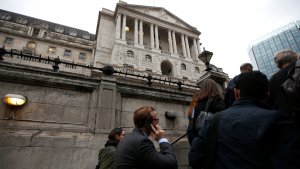The BoE now thinks Britain's economy will expand by around 1.25% this year, up from a previous forecast of 0.5%.
Bank Of England Cuts Rates From 16-Year High, Will Be 'Careful' On Next Moves
The BoE now thinks Britain's economy will expand by around 1.25% this year, up from a previous forecast of 0.5%.

The Bank of England cut interest rates from a 16-year high on Thursday after a tight vote by its policymakers who were split over whether inflation pressures had eased sufficiently.
Governor Andrew Bailey led the 5-4 decision to reduce rates by a quarter-point to 5% and he said the BoE would move cautiously going forward.
It was the central bank's first cut since March 2020, at the start of the COVID-19 pandemic, giving Britain's new government a boost as it seeks to speed up the pace of economic growth.
But Bailey stressed the BoE was not committing to a series of quick reductions in borrowing costs.
"We need to make sure make sure inflation stays low, and be careful not to cut interest rates too quickly or by too much," he said in a statement.
Most economists polled by Reuters had expected a cut while financial markets had seen just over a 60% chance.
Sterling slipped to its lowest against the U.S. dollar since early July and bond yields also fell slightly after the BoE's announcement with the yield on 10-year gilts touching its lowest since March.
Bailey insisted the BoE would take its decisions on rates "from meeting to meeting" but investors were betting on another rate cut this year with the chance of a move at its next meeting in September seen as a roughly 55% probability.
"The Bank of England is staying tight-lipped on when it expects to cut rates again," ING economist James Smith said. "But we think better news on services inflation and wage growth can unlock one, or more likely two rate cuts by year-end."
Borrowing costs had been on hold for almost a full year - the longest period they have been left unchanged at the peak of a BoE tightening cycle since 2001.
In June, the BoE's Monetary Policy Committee voted 7-2 to keep rates on hold. Minutes of the August meeting showed the decision to cut them was "finely balanced" for some members.
None of the policymakers whose votes changed the balance - Bailey and Deputy Governors Sarah Breeden and new MPC member Clare Lombardelli - had spoken publicly about monetary policy since June.
Speaking opportunities had been limited by the July 4 election which brought the Labour Party to power.
The BoE said policymakers had been briefed on this week's announcements of big public-sector pay increases and on fiscal policy, but their impact would only be incorporated into the BoE's forecasts after the Oct. 30 budget.
Finance minister Rachel Reeves welcomed the rate cut but said millions of families still faced higher mortgage rates and she reiterated her plan to "fix the foundations of our economy after years of low growth."
British consumer price inflation returned to the BoE's 2% target in May and stayed there in June, down from a 41-year high of 11.1% struck in October 2022.
This leaves British inflation lower than in the euro zone - where the European Central Bank cut rates in June - and the United States, where on Wednesday the Federal Reserve opened the door to a September cut.
INFLATION TO RISE
The BoE expects headline inflation to rise to 2.75% in the final quarter of 2024 as the effect of steep falls in energy prices fades, before returning to its 2% target in early 2026 and later sinking below.
The long time lags for interest rates to affect inflation mean the BoE is more focused on what it sees as medium-term drivers of inflation: services prices, wage growth and tightness in the labour market.
The BoE linked June's strong services inflation to "volatile components" and regulated prices that were influenced by high headline CPI earlier in the year.
Wage growth at nearly 6% is almost double the rate the BoE views as consistent with 2% inflation but is slowing in line with the central bank's expectations.
The BoE now thinks Britain's economy will expand by around 1.25% this year, up from a previous forecast of 0.5%, after stronger-than-expected growth earlier this year.
Based on International Monetary Fund forecasts, that would be stronger growth than in France, Italy and Germany. Surveys of businesses published earlier on Thursday suggested growth in Britain last month was stronger than in much of the euro zone and Asia.
The BoE said unemployment will rise slightly, reducing upward pressure on inflation. However, it acknowledged the risk that price pressures might prove more persistent and keep inflation above target for longer than its main forecast.
Next month the BoE must decide whether it continues the annual 100 billion-pound pace of reductions in its bond holdings.
The BoE repeated its view that these sales had a limited impact on the gilt market and said the high level of interest rates would allow it to fine-tune monetary conditions if it proved greater in future.
(Additional reporting by Kylie MacLellan, Alistair Smout and Sarah Young; Editing by Toby Chopra and William Schomberg)
Thanks for signing up to Minutehack alerts.
Brilliant editorials heading your way soon.
Okay, Thanks!
